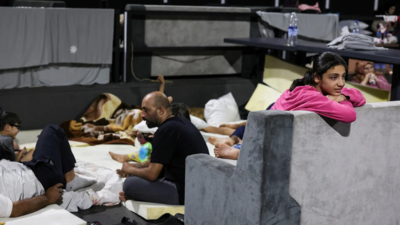
A family rests in the famous Skybar club, which became a shelter for the displaced who fled, amid ongoing hostilities between Hezbollah and Israeli forces in Beirut’s southern suburbs and its surroundings, in Beirut, Lebanon October 2, 2024. (Reuters) GENEVA: UN officials said on Friday most of Lebanon's nearly 900 shelters were full and that people fleeing Israeli military strikes were increasingly sleeping out in the open in streets or in public parks. "Most of the nearly 900 government established collective shelters in Lebanon have no more capacity," the UN refugee agency 's Rula Amin told a Geneva press briefing.
She said that they were working with local authorities to find more sites and that some hotels were opening their doors. "People are sleeping in public parks, on the street, the beach," said Mathieu Luciano, the International Organization For Migration 's office head in Lebanon. He confirmed that most shelters were full, including those in Beirut and Mount Lebanon, but said some others had space.

He voiced concern about the fate of tens of thousands of mostly female live-in domestic workers in Lebanon whom he said were being "abandoned" by their employers. "They face very limited shelter options," he said, adding that many of them came from Egypt, Sudan and Sri Lanka. Lebanese authorities say more than 1.
2 million Lebanese have been displaced and nearly 2,000 people killed since the start of Israeli conflict with Lebanon's Iran-backed Hezbollah group over the last year, most of them over the past two weeks. On Friday, Israeli strikes sealed off Lebanon's main border crossing with Syria, blocking the way for vehicles, although the UNHCR's Amin said that some were crossing on foot. "We could see that some people were walking, desperate to flee Lebanon, and so they walked actually through that destroyed road," she said.
.










